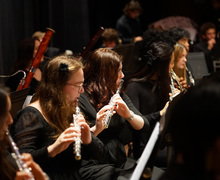Councilor-elects say Ben Walsh faces tough term in office as Syracuse’s next mayor
Phillip Bryant | Contributing Photographer
Joe Driscoll, the District 5 councilor-elect, and Tim Rudd, an at-large councilor-elect, both said Mayor-elect Ben Walsh faces several major challenges as he takes over City Hall.
A crop of young politicians will be starting terms next year on Syracuse’s Common Council as the city faces a looming budget crisis.
Joe Driscoll, 38, was elected earlier this month to represent District 5, which includes parts of University Hill. Driscoll, an Eastwood resident, has traveled across the world as a beatboxing musician and campaigned for Sen. Bernie Sanders (I-Vt.) in the 2016 presidential election.
His council bid was endorsed by the Democratic and Working Families Parties. Driscoll is replacing Nader Maroun on the council. Maroun is term-limited.
Tim Rudd, an Elmwood resident who won an at-large council seat in the general election, is a Syracuse University alumnus and former New York City budget analyst. He’s 35.
Rudd graduated from the Maxwell School of Citizenship and Public Affairs in 2007 with a master’s degree in public administration. He was also endorsed by the Democratic and Working Families Parties.
Both Driscoll and Rudd have never previously held elected office.
In interviews, the two councilor-elects detailed their stances on several city issues, including Mayor-elect Ben Walsh’s transition, Syracuse’s budget deficit, housing vacancies and SU’s relationship with communities in central New York.
Working with Ben Walsh
A couple weeks before the election, Driscoll endorsed Walsh, 38, in a Syracuse.com op-ed. The independent would bring a fresh perspective to City Hall, setting aside “petty” partisan politics, Driscoll wrote at the time.
But despite his support for Walsh, Driscoll said he knows the new mayor and Common Council will clash over issues.

Sam Ogozalek | Asst. News Editor
“People have shared their concerns about him, his close relationship with developers,” Driscoll said. “I’m not saying I’ll agree with him 100 percent of the time, but I have the faith we’ll be able to disagree and still move forward.”
Driscoll said both Walsh and the Common Council shouldn’t keep a “scorecard of ‘who got vengeance on who.’”
Rudd said he wants Walsh to be specific when answering questions asked by the council, including how the mayor-elect plans to fill Syracuse Police Department vacancies.
“I think his hypothesis is that ‘Me being apolitical means I will be functionally political with everybody,’” Rudd said. “And that’s what we’re gonna have to learn. I guarantee it won’t be easy. Can he do it? I don’t know. I hope so.”
Looming budget crisis, housing vacancies
During the mayoral race, it was Green Party candidate Howie Hawkins’ tagline: “I want to be the next mayor of Syracuse, not its last mayor.”
“It kinda gave me chills every time I heard it,” Driscoll said. “I got upset whenever he would say it, because I love this place.”
Syracuse’s projected budget deficit for the 2017-18 fiscal year is $16.5 million, finance records show. Driscoll said Walsh faces “the most challenging years … in Syracuse’s history” and hopes the mayor-elect fights to keep the city away from state control.
Buffalo was placed under the watch of a New York state-appointed financial control board in 2003 after facing a potential budget gap of hundreds of millions of dollars. A financial control board makes all major financial decisions for a city.
Some politicians, including Driscoll, fear New York officials could take over Syracuse’s financing within the next few years.
Destabilized neighborhoods with high rates of poverty are already an issue in Syracuse, Rudd added. He said vacant, visibly crumbling houses are scattered across the South Side.
But there’s a hidden danger spreading throughout the entire city, he said, that officials need to address.
“If you were to look at the demographics of the outer neighborhoods, the crisis is bigger than anyone has ever imagined,” Rudd said. “Because the houses look OK right now. But they’re full of older people with no kids, who are aging in place, who are not going to stay there forever. And there’s no demand for young people with jobs to move in.”
SU’s city relationships
As a councilor, Driscoll wants SU students to feel comfortable throughout the whole city and not just the “oasis” of Marshall Street, he said. Informing the campus of Syracuse art and music events is key, Driscoll said.
The District 5 councilor-elect would like to see SU also investing in community partnerships modeled off a university-sponsored co-op in Cleveland. That co-op, called the Evergreen Cooperative Initiative, aims to create living-wage jobs in low-income neighborhoods.
Case Western Reserve University helps fund Evergreen.
Rudd, meanwhile, said the city should look to support SU’s growth. It’s the biggest economic engine in central New York, he said.

Kai Nguyen | Staff Photographer
“I definitely agree with (SU’s) current vision of moving away from South Campus, building on Main Campus, making it more dense,” Rudd said, referencing Chancellor Kent Syverud’s major Campus Framework project, which includes phasing out South Campus housing.
Syracuse once exported manufacturing products to other countries, he said. Now, Syracuse is exporting education to other countries, through SU, as international students travel to the United States for college.
“How should we be building around (SU)?” Rudd said.
Published on November 15, 2017 at 11:04 pm
Contact Sam: sfogozal@syr.edu | @SamOgozalek





